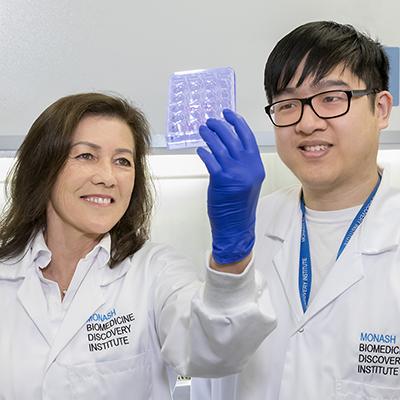
Credit: Monash University
The thymus is the powerhouse producing the immune system’s T cells, which combat infection in our body. Yet this vital organ is one of the first to diminish in function as we age, resulting in a gradual loss of T cell production and eventually increased susceptibility to infections and cancer in the elderly.
Monash Biomedicine Discovery Institute (BDI) researchers have for the first time identified factors affecting the cells in the thymus that set in motion this loss and the mechanisms behind this.
Their study, published in Cell Reports today, paves the way to develop targeted strategies for the recovery of T cells to help combat infections and cancers.
Associate Professor Ann Chidgey, senior author, said it had been known for some time that the thymus – a small organ located below the collarbone – degenerated from puberty onwards. However, the mechanisms underlying this were unclear.
“Our thymus is most productive soon after birth and produces a full repertoire of T cells, but then slowly begins to lose function. As we live longer, the diversity of our T cells diminishes and we become more susceptible to infections,” she said.
“It also becomes more difficult to recover our T cell immunity after damage from cancer treatments such as chemotherapy which destroy a lot of our immune cells.”
The study showed what was behind this degeneration; factors affecting the epithelial stem cells in the thymus.
“This study identifies BMP4 and Activin, as growth and differentiation factors important for the self-renewal and differentiation of thymic epithelial stem cells, and how a change in their production during ageing causes a loss of mature epithelial cells. This leads to a reduced capacity to support the production of T cells,” Associate Professor Chidgey said.
“This is the first time anyone has identified the basis for mature thymic epithelial cell loss and the molecules that are involved in the dysfunction of the thymic epithelial stem cells in ageing. By doing this we can now focus on how to reverse that and ‘switch on’ the thymus again, even just transiently, to replenish our T cell diversity,” she said.
“We believe these changes can be reversed and are beginning new investigations to see if we can develop a treatment focussed on thymic epithelial cell regeneration.”
###
Drs Ailin Lepletier and Michael Hun were joint first authors on the paper.
This research was supported by a National Health and Medical Research Council (NHMRC) grant.
Read the full paper in Cell Reports titled Interplay between Follistatin, Activin A, and BMP4 Signaling Regulates Postnatal Thymic Epithelial Progenitor Cell Differentiation during Aging.
About the Monash Biomedicine Discovery Institute
Committed to making the discoveries that will relieve the future burden of disease, the newly established Monash Biomedicine Discovery Institute at Monash University brings together more than 120 internationally-renowned research teams. Our researchers are supported by world-class technology and infrastructure, and partner with industry, clinicians and researchers internationally to enhance lives through discovery.
Media Contact
Grace Williams
[email protected]
Related Journal Article
http://dx.




